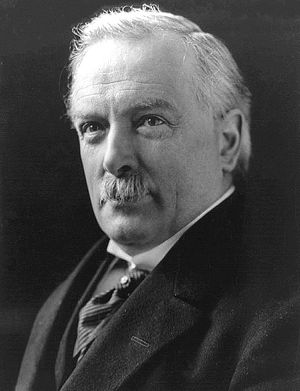David Lloyd George (Q57923): Difference between revisions
Jump to navigation
Jump to search
(Removed claim: National Library of Wales Authority ID (P12): lloyd-george-david-1863-1945-memorial-unveiling-order-of-service-nlw-ms-22752c-ff-48-56) |
(Removed claim: National Library of Wales Authority ID (P12): lloyd-george-david-1863-1945-national-insurance-bill-1911-signed-by-nlw-ms-4478e) |
||
| Property / National Library of Wales Authority ID | |||
| Property / National Library of Wales Authority ID: lloyd-george-david-1863-1945-national-insurance-bill-1911-signed-by-nlw-ms-4478e / rank | |||
Revision as of 19:10, 10 December 2023
Prime Minister of the United Kingdom from 1916 to 1922
- Lord Lloyd-George
- George David Lloyd
- Earl Lloyd-George
- David Lloyd George, 1st Earl Lloyd-George of Dwyfor
- George Lloyd
| Language | Label | Description | Also known as |
|---|---|---|---|
| English | David Lloyd George |
Prime Minister of the United Kingdom from 1916 to 1922 |
|
Statements
17 January 1863Gregorian
9 references
26 March 1945
8 references
David Lloyd George, Liberal statesman and Prime Minister from 1916 until 1922, was born in Manchester in January 1863. His father died the following year and his mother took herself and her children to live with her brother Richard Lloyd (1834-1917) at Llanystumdwy, where David attended the National School. He qualified in law in 1884 and began to practice as a solicitor at Cricieth; he became known in his profession as a fierce advocate and an eloquent speaker. Together with his younger brother William George (1865-1967) he set up the family legal practice Lloyd George and George. In 1890 Lloyd George was elected Liberal MP for the Caernarvonshire Boroughs. His interests at this time were mainly those of Wales, including the Disestablishment of the Welsh Church and land reform; he was also prominent in the nationalistic movement Cymru Fydd which was founded in 1886. He also opposed the conduct of the South African war (1899-1902) and the 1902 Education Act. Upon the formation of a wartime coalition government in 1915, Lloyd George became Minister of Munitions, and in 1916 he succeeded first Lord Kitchener, as Secretary for War. On Asquith's enforced resignation in December 1916, Lloyd George became Prime Minister, steering Britain through the First World War and appearing prominently in the subsequent Paris Peace Conference of 1919. When, in November 1922, the Conservative members of the government took their decision to resign, thus making it impossible to continue the Coalition, Lloyd George also resigned his post as Prime Minister. Though he never held office again, he did however remain politically active for a number of years, even travelling to Germany to meet Adolf Hitler in 1936. In 1945, the last year of his life, Lloyd George was created 1st Earl Lloyd George of Dwyfor and Viscount Gwynedd. He died at Ty Newydd, Llanystumdwy on 26 March 1945 and was buried near the river Dwyfor.
0 references
A Nonconformist Genius (The Right Hon. D. Lloyd-George, M.P.)
0 references
Otium cum dignitate! Mr. Lloyd George and the Duke of Atholl in the Highlands
0 references
The conference on the constitutional question a meeting between leaders of the government and leaders of the opposition in Mr. Asquith's private room at the House of Commons
0 references
Mr. David Lloyd-George, M.P the Chief Nonconformist critic of the Education Bill in the House of Commons
0 references
The Right Hon. Mr. D. Lloyd George Chancellor of the Exchequer
0 references
Mr. Lloyd George addressing an overflow meeting at Newcastle on Saturday
0 references
Mr. Lloyd-George's warm welcome at Newport, on his way to Treorchy
0 references
Right Hon. D. Lloyd George who leaves the Board of Trade (£2,000) to become Chancellor of the Exchequer (£5,000)
0 references
